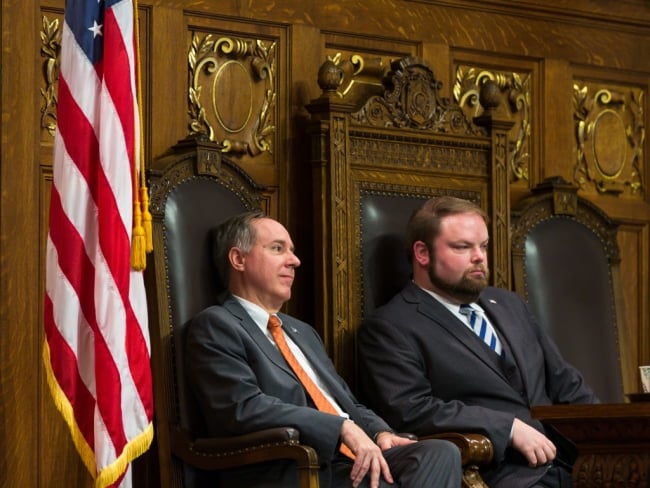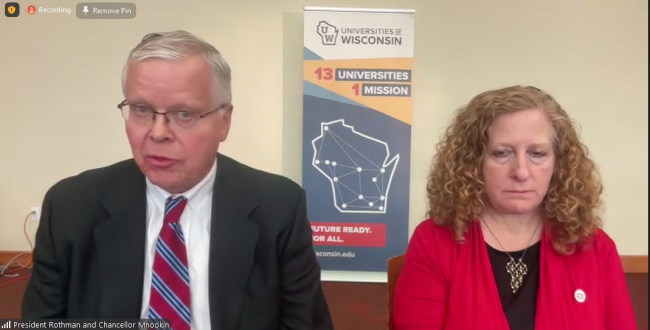You have /5 articles left.
Sign up for a free account or log in.

Robin Vos (left), the Republican speaker of the Wisconsin State Assembly, has waged a six-month battle of wills with the state’s public university system, holding up crucial funding while demanding cuts to DEI.
Andy Manis/Getty Images
A nearly six-month standoff between the Universities of Wisconsin and the Republican-led state Legislature over diversity, equity and inclusion spending seemed poised to end Saturday morning. The Board of Regents had agreed to vote on a deal between system leaders and Assembly Speaker Robin Vos that would freeze and cap DEI hiring in exchange for funding held up by the Legislature.
But in a shocking turn of events, the board rejected the proposal 9 to 8 , leaving over $800 million on the table and the future of the system’s DEI offices in limbo. The board also voted not to table the vote for further discussion, effectively killing the deal.
On Friday, UW system president Jay Rothman and UW Madison chancellor Jennifer Mnookin announced they’d reached a deal with Vos after weeks of secret negotiations. The system would make significant concessions on DEI initiatives and staffing in exchange for a release on much-needed funding for pay raises, utilities and construction projects—including a new engineering building at UW Madison—which the Legislature rejected last month.
“The agreement we’ve reached is the result of an arduous process,” Rothman said during a press conference Friday afternoon. “While it funds UW, it also makes compromises to get there.”
Rothman recommended that the board vote to approve the resolution at a special meeting Saturday morning. But in the hours between the deal’s announcement at the meeting, multiple factions within the UW system and state government made a concerted effort to convince regents to vote no. The faculty union issued a strong rebuke of the proposal Friday afternoon, and that night Assembly Democrats and UW student groups gathered more than 1,000 signatures on a petition opposing the deal, which they sent to board members.
Representative Dora Drake, a Democrat and member of the House’s Black caucus, told Inside Higher Ed that she did not expect the proposal to be defeated, but she was heartened.
“I was very surprised, but I feel very good about the board’s decision,” she said. “We’re making sure students of color feel welcome and protected at our universities.”
In a statement issued Saturday afternoon, Vos and his fellow Assembly Republicans issued a statement decrying the decision. They did not indicate whether they were open to returning to the negotiating table with system leaders.
“It’s a shame they’ve denied employees their raises and the almost $1 billion investment that would have been made across the UW system, all so they could continue their ideological campaign to force students to believe only one viewpoint is acceptable on campus,” the statement read.
The failed proposal included the following concessions from the system:
- A cap on all DEI hires, to remain in place for three years.
- Renaming and redefining the positions of one-third of DEI staff—about 45 system employees—to roles more closely related to student success.
- A three-year freeze on all new administrative hires across the system.
- Elimination of the UW TOP program, an initiative to promote diverse faculty hires, to be replaced, starting next year, with a program promoting faculty who support underrepresented and “at-risk” students.
- Excising the diversity statement currently included on applications to two UW campuses.
- Creating a new endowed faculty chair at UW Madison dedicated to conservative economic thought, classical economics or classical liberalism.
- Implementing a new module on free expression for all entering undergraduate students.
- Adoption of a guaranteed admissions program for the top 10 percent of state high school graduates, who would automatically be accepted to all UW campuses except Madison, which would take the top 5 percent.
In return, the state Legislature would free up funding for pay raises by Dec. 31 at the latest, as well as over $800 million in funding for utilities, maintenance and essential construction projects like new dormitories and the long-awaited engineering facility at UW Madison.
The UW system’s struggle to secure the funds has been part of a deepening nationwide political schism over diversity, equity and inclusion spending, especially at public universities. The state has avoided the kind of anti-DEI legislation that passed in red states such as Florida and Tennessee largely because there is a Democrat in the governor’s office.
“Our caucus objective has always been aimed at dismantling the bureaucracy and division related to DEI,” Vos wrote in a statement announcing the deal Friday. “I’m proud that Wisconsin is the first state with [a] divided government to make real progress on reducing these negative influences across our public higher education institutions.”
The board’s rejection of that deal is a symbol of a growing spirit of resistance from DEI advocates and embattled institutions, Drake said, even as Republicans across the country grow more entrenched in their attacks on the practice.
“This really shows the power of organizing and lets people know that Wisconsinites truly value diversity,” she said. “But the work continues. This is not the last strategy Representative Vos and the Republicans will attempt.”
The deal immediately garnered opposition from faculty and students, who said it would be a hard-fought victory for the right wing of the Legislature and deal a blow to students and faculty of color.
“We do not want our administration to make a deal that sacrifices much-needed DEI resources for our students,” Jon Shelton, the vice president for higher education at the American Federation of Teachers–Wisconsin, the statewide public educators’ union, told Inside Higher Ed before the vote. “Not that we want to forgo a salary increase, but if it’s a choice between that and our students’ needs, we’re going to stand with our students.”
Rothman had emphasized repeatedly that the system’s “commitment to values of diversity and inclusion” would be unaffected by the deal. Mnookin said that DEI was not going away, but rather that the system was beginning a process of “reimagining” it along the lines of student success—a message that echoes those of other public universities that have restructured their DEI offices under political pressure. But both leaders recognized that the outcome is far from ideal.
“Neither side thinks this is the greatest thing since sliced bread,” Rothman said. “That’s just reality.”

Universities of Wisconsin president Jay Rothman (left) and UW Madison chancellor Jennifer Mnookin gave a virtual press conference announcing the deal Friday.
Liam Knox/Inside Higher Ed
Critics described the war of attrition that played out in the Wisconsin Legislature as an unorthodox tactic in an increasingly bitter conflict, and its success could embolden other states with split governments, such as Kentucky, to take similar action.
In the lead-up to the vote, Drake said that while she understood the pressure the system has been under, the money isn’t worth the price of the political and cultural victory she believes the system would be handing to Wisconsin Republicans—and other conservative state legislators across the country.
“I’m sympathetic, and [the system leaders] are in a tough position. But there are some things you just can’t compromise on,” she told Inside Higher Ed. “If we concede now, there’s no stopping that train.”
A War of Attrition
In June, House Speaker Vos held up a vote on the state budget by proposing a last-minute $32 million cut to the system—the amount that Vos alleged UW is currently spending on the salaries of DEI-focused employees—unless the university eliminated its DEI offices and positions. Governor Tony Evers, a Democrat, threatened to veto the entire state budget, and the appropriations process ground to a halt.
The state budget wound up passing with a partial veto by Evers that prevented DEI staff cuts, though it still included significant cuts to higher ed funding in a year of ample financial surplus for the state. But at the last minute Vos made good on his threat to block the $32 million, which the system had earmarked for staff cost-of-living adjustments and raises. That money has been in limbo ever since.
After months at a standstill, the pitched battle over the withheld higher ed funding reached a boiling point this fall. Evers sued Republican lawmakers for “obstructing basic government functions” by freezing funding. In early November, the UW system proposed a plan to secure the money by promising to invest the funds in workforce development for engineers, nurses, data scientists and businesspeople, but Vos stood firm in his demand that the university also cut back on diversity programs.
Secret negotiations between system leaders and lawmakers have been underway for weeks, according to legislators with knowledge of the deal-making, as a last-resort effort to secure the funds and end the impasse.
“This has been a difficult process,” Mnookin said during Friday’s press conference with Rothman. “We recognize the stress and strain this has caused our communities as it has played out over the past six months, partly in public.”
In putting the DEI restructuring proposal to the Board of Regents Saturday, the deal aimed to circumvent Evers and his veto power, which killed the proposed DEI cuts the first time around.
“[State Republicans] are trying to make sure nothing concerning DEI ever has to come through the Legislature and be subject to Evers’s veto,” Drake said. “It’s absolutely about circumventing that fail-safe. They’re desperate to demonstrate their power.”
The whole ordeal has been a grand display of “political showmanship” from state Republicans in general, and Vos in particular, Drake said.
“He had every opportunity to come to a compromise, but instead he put his foot in his mouth and we haven’t moved an inch,” she said. “It’s downright insulting.”
The Dangers of Budgetary ‘Brinkmanship’
Tom Harnisch, executive vice president of the State Higher Education Executive Officers Association, expressed worry that legislators don’t understand how much their entrenched position could damage the state system’s reputation and ability to function—or worse, that they don’t care.
“Higher education is vulnerable to these kinds of political games from state lawmakers, as it does not have the political power of other state interest groups,” he said. “This kind of brinkmanship is really disappointing, not to mention shortsighted … the Universit[ies] of Wisconsin is a huge economic asset to the state, and it should be treated as such.”
Shelton, who is also a professor of justice studies at UW Green Bay, said the effects of what he calls politically punishing budget cuts are already showing throughout the system—especially at smaller campuses facing severe deficits after a decade of austerity. In the past two months, UW Green Bay announced that it would cut six majors and minors; UW Platteville cut 12 percent of its workforce, eliminating over 100 positions; and UW Oshkosh, facing an $18 million shortfall, cut 200 positions and laid off 140 employees.
“I’ve been at the UW system for 11 years, through Act 55 in 2015 that took away shared governance and tenure and through rounds of massive budget cuts,” he said. “This is the worst I’ve ever seen faculty and staff morale.”
Rothman seemed conscious of the worsening tension between higher education and state policymakers, and he said he hoped the deal could be a first step in realigning the system’s goals with those of the Legislature.
“This agreement can hopefully reset our relationship with the Legislature,” he said. “Our universities rank 42nd in the nation for public funding; we will continue to advocate for our state to do better.”
Harnisch said it’s not just DEI driving the budget crisis in Wisconsin; after generations of legislative commitment to higher education as a public good, a political shift in the early 2000s has led to years of cuts and stagnation, which the university systems have struggled to overcome.
“Every budget cycle for the past 10 years, the Wisconsin Legislature conjures up a new reason not to fund the UW system,” he said. “Now it’s DEI, but in 2025 it will be something else.”









